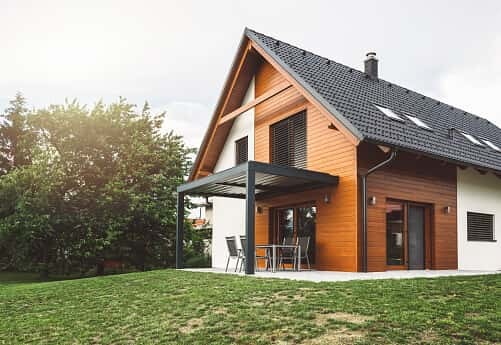How to save on homeowners insurance
11 ways to lower your premiums

If you’re looking to save on your home insurance, consider shopping for a new policy, bundling your policies or improving your borrower portfolio (raising your credit score, etc.). Insurance companies prefer low-risk clients, and many reward risk-reducing actions with discounted rates.
Key insights
- Shop around with multiple insurers to find the best package for your budget without compromising coverage.
- You might qualify for discounts if you install a home security system, whether it’s monitored or has video surveillance.
- A higher credit score can lead to better insurance quotes, so consider improving your credit score before purchasing a policy.
- You can save on your premiums by bundling your homeowners insurance with your auto insurance coverage.
11 ways to save on homeowners insurance
To save on homeowners insurance, shop around for the best package for your budget without compromising coverage. You might also consider raising your deductible, paying off your mortgage, replacing your roof and reviewing your coverage annually to find savings.
1. Shop around for policies
When comparing quotes, you might be surprised to find a wide variety of options — and prices. Shop around with a variety of insurers to find the best package for your budget, but make sure you don’t skimp on coverage in the name of a lower price. With almost any major purchasing decision, comparing quotes from multiple companies is a good way to start.
» CALCULATE: How much does homeowners insurance cost?
2. Install a security system
Installing a home security system is a great way to qualify for a discount. Some insurers may require the system to be monitored by a professional company, while others are OK with simple video surveillance. If you’ve already installed an alarm system, look for a provider that offers a discount for it. If you don’t have a home security system already, consider buying one for a rate discount and additional security.
» COMPARE: Best home security systems
3. Improve your credit score
Your credit score plays a role in the cost of your premiums. Insurance companies use your credit score to make an educated guess about how likely you are to make a claim; if you have a high credit score, you’ll likely receive better quotes.
If you’ve had your identity stolen and it’s tanked your credit, you can work with a credit repair company to mend the issue.
Consider working with a credit repair company if your credit score is low for reasons that aren’t your fault, such as identity theft. Make sure you don’t open a new credit account during the homebuying process — that can impact your credit score when you need it to be the highest.
4. Bundle policies
Bundling policies can save you a decent chunk of change on your premiums. It can also help streamline your claims process and insurance proceedings. Juggling multiple insurance policies throughout the year can make it more difficult to budget and stay on top of payments — bundling your insurance policies can be a great way to save time and money and prevent headaches throughout the year.
5. Make safety improvements around the house
Certain safety improvements, like fire alarm systems, can show your insurance company that you take prevention seriously. Because adequate safety measures can make a world of difference in terms of overall damage, you may qualify for a discount when you make improvements like installing storm shutters and sprinkler systems for fire suppression.
» MORE: Should I use a personal loan for home improvements?
6. Ask about other discounts
Home insurance providers offer many discounts to policyholders. When comparing insurers, be sure to compare common deals like discounts for bundling policies, home security systems, new appliances, loyalty discounts, home improvements and nonsmokers. There may be savings for military personnel or seniors as well.
7. Raise your deductible
In general, the higher your deductible, the lower your premium.
While we don’t recommend maxing out your deductible, we do think you should find that sweet spot where you can comfortably pay out a deductible while still saving money on your premium.
According to the Insurance Information Institute, home insurance deductibles apply each time you file a property damage claim in most states. However, there generally isn’t a deductible for the liability portion of a policy.
8. Pay off your mortgage
The requirements for homeowners insurance usually go away when you pay off your mortgage loan in full. First, check to confirm that you don’t owe any residual costs, such as escrow fees, and remove your lender’s name from the policy. You could adjust your policy to save money or drop coverage altogether if you want.
For most homeowners, their house is their largest asset and more significant investment, so it still makes sense to maintain a homeowners insurance policy for financial protection.
» MORE: What is escrow?
9. Replace your roof
Getting a new, impact-resistant roof may be expensive, but it might also get you a discount on home insurance. Make sure to check what type of roofing or material qualifies for a discount before you pay for service.
If you decide to replace your roof, it might be a good time to consider going solar, like some reviewers on our site. Often the solar panel installation process involves roof updates anyway, so you could make two money-saving moves at once.
10. Review coverage each year
Your needs may change over time, meaning your coverage should too. For example, if you used to have precious jewelry coverage but recently bought a safe, you may consider canceling that part of your coverage. Looking at your policy lets you be sure you’re only paying for the level of coverage you need at the time.
Just like any other type of insurance, you have the right to change your coverage and provider at any time. You may have to pay a penalty for canceling coverage before time is up, though.
11. Stay with the same insurer
Many providers offer a loyalty discount that lowers premiums the longer you stay with them. While it’s a good idea to compare premiums every year or so, you should also consider what discounts you’re missing if you don’t stay with the same provider. Most of these loyalty discounts don’t kick in until at least the third year of service.
A few reviewers on our site have reported similar discounts for home warranty coverage, so investigate this potential if you also have a warranty plan.
|
|
|
FAQ
Is home insurance cheaper without a mortgage?
Lenders require that homeowners carry a specific level of coverage. After you pay off your mortgage, you can adjust your coverage level, which could lower your insurance premiums. However, premiums don't automatically get cheaper just because you pay a mortgage off.
Why is my homeowners insurance so expensive?
Your home insurance might be expensive because of your location (for instance, If you live in a high-crime area or an area known for flooding). Other factors that impact home insurance costs include the age of your home, what’s included in your policy, your deductible amount and failure to take advantage of discounts.
High-risk home features, including pools, can also raise your premium.
Do security cameras lower the cost of insurance?
In some cases, installing security cameras can lower your insurance premiums. Many providers offer discounts for homeowners who install security systems and cameras around their house. This can be an excellent way to save on your premium while also safeguarding your assets.
Will a new roof lower my insurance premium?
A new roof will usually lower your insurance premium. Basically, this signals to your home insurance company that you’re less likely to make a claim for roof repair or replacement.
Does having a safe reduce the cost of homeowners insurance?
Having a safe does not automatically reduce your homeowners insurance premiums. However, if you have a safe, you might not need to buy additional coverage for your personal belongings, which will reduce the cost of your overall policy.
Is homeowners insurance negotiable?
No, homeowners insurance premiums aren’t usually negotiable, but coverage levels are somewhat flexible. This means you can adjust your policy and deductible levels to get a cheaper rate.
You’re signed up
We’ll start sending you the news you need delivered straight to you. We value your privacy. Unsubscribe easily.



